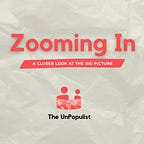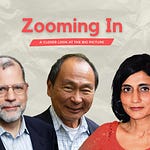Listen to Zooming In at The UnPopulist in your favorite podcast app: Apple Podcasts | Spotify | Google Podcasts | RSS
Aaron Ross Powell: Welcome to Zooming In from The UnPopulist. I'm Aaron Ross Powell. Joining me today is Berny Belvedere, the new senior editor at The UnPopulist. We're going to chat today about the state of politics and the defense of liberalism.
A transcript of today’s podcast appears below. It has been edited for flow and clarity.
Aaron Ross Powell: Berny, let's maybe start with a bit about you.
Berny Belvedere: Thanks, Aaron, for having me on. I'm really stoked to be here. So, I was born in Buenos Aires, Argentina, which, just a funny thing about that: the literal translation of Buenos Aires is something like good air. But really, I think, the key idea that that name tries to get across is something like friendly skies. It's the capital of Argentina. I didn't get a chance to know it too well—we left when I was four and a half, five-ish. We had an opportunity to become citizens really quickly here in the United States, so my parents took that opportunity and we went from Buenos Aires to Kansas City, Kansas, on the Kansas side of things. We're one of the few on the Kansas side of the divide. Then, for my high school years, we moved to Miami, Florida.
So those are the places where I've lived. It's an interesting mix of different types of arrangements and social configurations, but it's also colored my approach to the kinds of places that I feel like society can build well. I've taken my love for suburban America from Kansas City. Miami is an international metropolis, very big on sprawl in a way that I don't quite prefer as much. I like a more densely concentrated type of city. Buenos Aires is just sort of European in its flavor, but also combining South American aspects as well.
Those are the places I've lived. Intellectually, I've pursued both theology and philosophy at a pretty high level. I didn't get a PhD, but I went for graduate degrees in philosophy and in theology. In the past, I guess if we were in medieval times, it would have just been one field of study, but with the specialization of knowledge, it forced me to get a degree in each. Even the theology that I did was very philosophical in nature. I guess that [philosophy] would be my overriding interest. That's a little bit about my background.
Lots of other stuff we could also talk about, though not the focus of this show. I'm married, got three kids, love sports and music, but let's stick to the stuff that the people want to tune in and listen to us talk about.
Aaron: Your academic background is theology and philosophy, but you're now working as senior editor for a political journal, and before that, you were working on another political outlet. What's the connection?
Berny: I've always been drawn to political philosophy. Even when I studied theology, I looked into the different traditions and what they had to say about the different polities and how society should be arranged—that was always a really interesting avenue of thought for me. In terms of now working for a journalistic outfit as opposed to some think tank or something else, I decided toward the end of my graduate degree in philosophy that a career in academia wasn't for me. The reason is partly vain, I'll admit. It's also partly, I think, morally okay. The vain part is I wanted to be a part of a broader conversation. Unless you become a kind of academic rock star, your work isn't going to be read by many people, maybe your fellow faculty in the department where you work, but that’s it.
“We've got these structural features in place that complicate our ability to genuinely have good discussions and intellectually rich discussions. Same as it always was, but one hope, a techno-optimist hope early on, was that technology in the social media age would try to counteract that, but we're not seeing that at all.”
I wanted to be part of a bigger conversation, so I pivoted to journalism where I've been privileged to be able to publish at some big venues and people interact with your work. They send you messages. Your thought becomes something that then someone else takes into consideration. Then that advances the conversation in a way where you're fortunate enough to be a part of an ongoing discourse about a topic.
That always moved me, so I pivoted to that. I've been working in political journalism for a while. I founded my own venue, Arc Digital, in 2016, right before the election. Ever since then, I've been involved in online writing and editing.
Aaron: Both of us then come from this background of academic ideas and enjoying those kinds of ideas, discussing them, communicating them and so on and both of us ended up leaning more into the popular audience's side of things than the strictly academic. When you look out at either the job as a political journalist or the state of political conversation, what role do you see for these kinds of ideas? Because we're in this weird time when it seems like on the one hand, ideological ideas are more dominant than it feels like they were 20 years ago.
Particularly on the right, you're seeing the populist movement which has a much more ideological streak than the more bland Paul Ryan conservatism at least professed to have. On the left, you're seeing the rise of their own kinds of ideologies about the nature of power and privilege in society. These are the sorts of heavy ideas that we grapple with but on the other side of things, it feels like the interest in high-level conversation has declined. That politics has been taken over by id, that we have elevated politicians who don't just speak in soundbites but often speak in incoherent soundbites. How do we navigate that?
Berny: I think that's a great question. From the beginning at Arc Digital, one of my goals was to take higher-level thinking, to take academic work—and I had reached out to members of faculties and different scholars—and distill some of this higher-level thinking into something that's more publicly digestible. Because that oftentimes represents really good argumentation that if you can just package in a way that is more palatable to the masses, it could influence thinking for the better.
That's been, for a long time, a kind of holy grail for people with these sensitivities to stronger forms of arguments and intellectual discourse. This is the holy grail: Are you able to take some of the awesome stuff that's being published at the research level and show it to the masses in a way where they can be receptive to it and it can influence their thinking? I think that's a great approach that responsible publications ought to take. Some of their output should be scholarly stuff, again, made into digestible forms for the masses.
I tried to do some of that at Arc. The UnPopulist does that really well where we work together with scholars and with editorial assistance and guidance we help the work come out in a publishable form where people can read it and get a lot from it. I think that's a burden of publications today that want to make a meaningful contribution to the discourse.
We're up against it. You're right. We're up against a discourse culture now where the basest forms of political point-scoring have penetrated how you go about participating in it, and it has turned everything into an “own the libs” aesthetic or on the other side, on the flip side of that, whatever that might look like.
Interspersed throughout all the attempts at high-level discussions and thinking, you get a whole lot of nonsense—so much of it, in fact, that it can feel like you're under a torrential downpour of it. You can't ever get to the good stuff because your feed [is dominated by this] and the people you follow [are drowned out by brasher voices]. You and I see this on the social media platforms that we're on. People are always complaining about the kind of deluge of crap that our feeds are now dominated by—and rightly so. It's partly a function of the way these spaces [are designed]—where tossing red meat to your followers is a way to increase engagement and increase your followership. Where not ceding a single inch to your opponents, even when you privately think that they've got something right, you know that if you do that, you're now subject to the blowback where people promptly unfollow you or they no longer see you as a reliable source for the position that they want championed.
We've got these structural features in place that complicate our ability to genuinely have good discussions and intellectually rich discussions. Same as it always was, but one hope, a techno-optimist hope early on, was that technology in the social media age would try to counteract that, but we're not seeing that at all.
Aaron: This sounds like a Marshall McLuhan, "the medium is the message" sort of argument. I'll just as an aside, I believe it was Ezra Klein who made this point on social media recently that the Marc Andreessen tech optimist manifesto, which didn't seem very optimistic but mostly just seemed very angry, was this interesting example of essentially the structure of Twitter colonizing the intellect and rhetoric of essay writing. That this essay was written in essentially a very long series of tweets, so not just short declarative statements, but also I think exactly the kind of thing that you're mentioning, which is rhetoric tuned to create engagement, anger, and that's spreading out.
Some of it seems like this started with cable news though. I don't know that we can pin all the blame on social media, but this seems like a problem for us. The UnPopulist publishes long and thoughtful essays on a wide range of topics that demand careful engagement and focused attention. We're not writing super academic stuff, but this is not a series of tweets and it's not a series of rage-bait declarations. This is all happening in a digital space that seems to structurally further incentivize that. How do we get out of that from the political standpoint?
Because we have to participate in it. The UnPopulist can't just be a print magazine that doesn't do anything digitally. We have to participate in this space. We have to communicate in ways that are to some extent native to the space if we want people to talk about it. This seems like a big problem for politics is that we have imposed structural limitations on the very discourse itself and then that's making things worse.
Berny: Absolutely. It's a problem, again, that is not new. When cable news arose and operated under a different coverage model, it was incredibly attentive to viewership numbers in a way where past network news channels—when there were so few of them—didn't have to be. Because, after all, where else were people going to go for their news? But cable news had to very closely pay attention to what people would want to hear.
I know there's a cartoonish quality to Aaron Sorkin's work at times. It can be extremely optimistic—but it’s a kind of naive optimism. So his show, The Newsroom, illustrates that same struggle where you have a news anchor who is constitutionally bothered by the fact that the masses appear to want to tune into a bunch of garbage and a bunch of dumb argumentation and just theatrics and he wants to tell the news. The underlying thesis of that show, which is profoundly mistaken, is that if you just give people the right information, they will see the value of it and then they'll lead better lives, they'll form better thoughts. We can call it the naive information theory.
That's been proven false because people time and again revert to wanting that sort of memefied, simplistic narrative that says, "My opponents are idiots and our side is so obviously correct," instead of an informative package that at times tells you, uncomfortably, "You're a bit wrong on this, the other side might be right, we're not totally victorious on this point." People just don't want that. There are neurological, psychological reasons for all of this, and reality is just structured that way. When you say we're up against it, we definitely are—and in a far deeper way than people realize.
Algorithms are calibrated to exploit all of this—[because these algorithms secure] the results that the social media platform engineers and big shots want. They keep people engaged. In a sense, [our approach to journalism, by contrast] has this counter-cultural vibe to it. Sure, there are people who do want argumentation and a platforming of opposing views at times. They want things that are infused with the intellectual virtues as you and I know them to be—but that's not the majority. That's not what people consistently want, even the good ones.
I don't want to make it seem like we're in a heroic quest of “us against the world,” but we do have the difficulty of belonging to an environment where the structural conditions frustrate our goals all the time. We are forced to model a better way within an ecosystem that doesn't really have time or patience for it. What else can we do? Like you said, we can't opt out. We'd be leaving the people who could be influenced by it without good quality stuff. We'd be leaving them to the wolves, as it were.
We have to be there even if our message at times is unpopular, or too nuanced [for the recommendation engine]. Of course, we don't get things perfectly right. But there's a difference between an outfit that is pandering to the worst impulses of a particular voting bloc and an outlet that will get things wrong in a way where they strove so hard to not get them wrong and to be fair. I think there's a lot of value in being that way and in doing that work even if you're going to ultimately suffer a lot of frustration.
Aarion: Do you see a relationship between the existing media and discourse landscape and the structural incentives that exist within it and so on and populism and the contemporary rise of populist movements?
Berny: I do. One of the big engines of populism is an uncritical acceptance to what “the folk” want in a naive sense without trying to tame them or corral them or even steer them toward a different way. That's reflected in the way that partisan news works today—say I’m The Blaze and I have a small impulse in my head to say, "Let's just tell the truth on this one." You know that you've got five or six other outlets on your level of scale—outlets such as The Daily Wire and others—who won't tell the truth on this topic and you're thinking, "The viewers will gravitate toward them if we don't pander in the way that they are doing there."
It crowds out any inkling of journalistic and objective integrity. Those are the partisan incentives that are there. Populism effectively takes a look at the vast swaths of the people that you're trying to win over and it says, "Let me reflect in my messaging to you the same values and urgings and promptings that you have in your heart without in any way challenging them to be better or corralling them into a more humane version of that.” It doesn’t care about doing that enhancing work. In fact, it often degrades people—taking them from where they were and helping them get worse rather than elevating them or ennobling them at all.
I think it's two sides of the same coin, absolutely.
Aaron: It seems we're stuck in this effectively rage feedback loop where as you say, it's become the role of what used to be the commanding heights of culture and the media and so on. Their role is now just reflecting back the anger, which then exacerbates the anger. We've all had an experience like that. That relative who becomes a diehard Fox News or Newsmax person and they just seem like the right anger keeps seeming to ratchet up because they get angry and then they watch everything through that lens of more anger. At the same time, are being told, "Your anger is justified, and here are more things you ought to be angry about," and it just snowballs.
This seems to be, not just psychologically bad for everyone. It's not good for you to live in a constant state of anger and hatred towards each other, but a real problem for liberalism as well, because we can talk about liberalism as a set of institutions or the rule of law, or a way of living in relationship to each other. One thing that liberalism is, I think because you can think of it as patience and equanimity towards each other.
“We are forced to model a better way within an ecosystem that doesn't really have time or patience for it. What else can we do? Like you said, we can't opt out. We'd be leaving the people who could be influenced by it without good quality stuff. We'd be leaving them to the wolves, as it were.”
That if liberalism is diverse, people going about their own conceptions of the good life in close proximity to each other and in cooperation with each other, in order for that to work, you can't be just enraged at every difference that you see and every person who's doing something that you wouldn't do. Especially if you have people on your television telling you, "Those people are trying to destroy America, they're evil, they're corrupting, they're sapping Western civilization of its precious bodily fluids," and so on, we need this patience and equanimity to simply get along with each other.
Simply getting along with each other is what liberalism is, but everything is tuned to pushing against that. Now we both are with The UnPopulist, which is critiquing the populist right but is doing so as part of a broader defense of liberalism. How do we talk about and defend liberal values in an environment where people are being encouraged to not embody them? Also in a lot of cases, in particular, on the right where these very liberal virtues of patience, toleration, equanimity, getting along, acceptance are portrayed as weak, as themselves corrupt.
That what you need is this stridency and anger and strength and toxicity and so on as a defense against the effete and civilization sapping and weakness of liberalism.
Berny: That's a tall order. First and foremost, we can produce the kind of work that models a better way. As we noted, that work is going to have a kind of ceiling to it, in the sense that because we're not out there posting in the manner that generates a lot of engagement or scores a cheap political point … our way has a natural ceiling to it that we can't overcome. We're not going to be able to overcome the limitations of this kind of work—just won't reach the masses in a way that a meme just dunking on your opponent will. Still, the primary font of our output is the work that we come out with.
In addition to that, I think we need to have ongoing discussions about what shape the liberalism that we expect to be resilient in our day and age should look like. Think, for example, of the discussions we've had in the past five years or so about Karl Popper's paradox of tolerance and the various ways that people landed on that—where if you are fully tolerant of all perspectives, some of those will be intolerant ones. It forces you to be intolerant, as someone who is advocating for tolerance, in order to get rid of the views that would complicate the social project. Perhaps you didn't want to be that aggressive, but you have to be because if you aren’t, it could lead to the unraveling of the very framework that you're trying to set up. During the medieval era, heading into the modern era, you had various forms of governments that were trying to break free from the shackles of religion, and its dominance on the social arrangement … they saw some people being a little bit too committed to their religious ideals. They understood that that could potentially be a challenge when you have two allegiances, one to the social contract and everything that that requires, and one to God and what you perceive God to be telling you to do. When push comes to shove, which one are you going to prioritize? That led to a lot of people who wanted a thriving, vibrant social framework to be in place, looking on at these really committed and devoted religious types and saying, "We have to deal with you a little harsher than we would want, just simply because your presence within this sphere represents an existential challenge to our increasingly liberal project.”
What does that look like today? We have dominant voices on the extremes, on both sides, but increasingly suffused throughout the entirety of the right, that are pushing for straightforwardly illiberal forms of society and forms of life. Should we move from a classical liberal, harm principle as our only guideline, where the negative liberty of—if you don't harm someone else, you can do whatever you want—mild procedural liberalism to a more muscular form of liberalism where you have to take more aggressive steps to counteract the tide of illiberal sentiment and proposals from people?
I do think there is a conversation that we should have about that, where our liberalism takes on a more aggressive posture. Not because we would ideally want to veer into a authoritarian approach to establishing liberalism, but because the very possibility of liberalism in this more heightened atmosphere requires it. What does that look like? Maybe putting pressure on our [private] social platforms to not be as free speech absolutist, but to take a stronger stance toward obvious and flagrant misinformation. In an era where the challenges to liberalism might not have been so severe, we could take the free speech value and say, "This is the value to defend, and so let's have zero restrictions."
In a time where all of that stuff is used toward the erosion of liberalism so that we could get something completely new and authoritarian and tyrannical, there are steps we can take, I think, to counteract that.
Aaron: All of that raises a lot of, I think, really interesting and extraordinarily thorny issues, complicated issues. One of the things that came to mind as you were saying that is I am just constitutionally, in many senses of that term, very worried about state intervention into basically everything. One of the really interesting things that we've seen is, say, for misinformation, the platforms have frequently, voluntarily, of their own accord, without outside regulatory pressure, taken steps to limit the spread of misinformation or to community label things that are misinformation as such, and other ways to just slow down its proliferation on their platforms.
They're doing it, partly because the leadership are people who don't want to see misinformation and can recognize the harms they can cause, and then partly because it turns out that platforms' customers like places that aren't just filled with conspiracy theories. Some customers do like that stuff, but it seems to be a minority. Your platform gets better traction if it's not full of trolls and misinformation.
What's been interesting is how those sorts of voluntary and speech behaviors, it simply is an exercise of free speech to label a tweet as, this is not true about vaccines or whatever, gets framed often by people not just on the right but centrist as well as abridgments of speech.
I'm thinking of there's recently something on the West—I think it was the Westminster Declaration that a bunch of people signed about free speech and the need for free speech. A lot of it was, it is censorship, it's a violation of speech norms for platforms to be labeling, for platforms to be undertaking this kind of stuff. There's this pushback not just on the prospects of state intervention but the prospects of just voluntary calling out, criticizing, and so on. It does raise these particularly complex issues within liberalism of what counts as the kind of stuff that crosses the line.
“We need to craft this norm and hammer it home: everyone should be able to say what they want. But it’s also important to hold that not everything they say is equally plausible. Those are two important things to hold in our heads at the same time. So when it comes to free speech, let's defend it to the hilt. But when it comes to building our institutions and platforms and wanting those to be a positive force in society, there is nothing wrong with the algorithm prioritizing views that meet certain criteria—views that are factual, that have a sensitivity to details and historical accuracy.”
If what you're saying is there's a line where a certain set kind of views or a certain quantity of a certain kind of views becomes sufficiently dangerous to liberal foundations, that we need to do something about that. We can't just let it go because the risks are too high. We have to decide where to draw the line. In a large sense, that seems to be the crux of a lot of the most vitriolic arguments right now is which views, expressions, beliefs are so dangerous to our ordered society that we have to crack down on them.
The right right now is basically thinks that LGBT identities cross that line, that the expression of or the promotion of these things, the mention of them in schools, whatever, will destroy our society and so ought to be prohibited. Critical race theory crosses the line for them, whatever it is they mean by critical race theory because that's a little ambiguous. On the left, you get certain traditional religious beliefs cross that line, non-acceptance of gay identities. Not the we need to stamp them out and exclude them from the public sphere but just like I don't personally want to be involved with it or I have expressed I don't think it's correct and so on.
Certain views about race or gender or class cross that line and it's not clear how we solve that without, in a sense, reverting to a illiberalism, without saying like, "Okay, you, Berny, it's going to be what you decide. You determine where the line is and that's it." That wouldn't be liberalism as we understand it or we put me in charge or we put some small star chamber in charge. It feels like that's where the conversation is going forward is figuring that out, is recognizing that liberalism needs defending and can fall into illiberalism or authoritarianism or fascism but at the same time, we all pursue motivated reasoning in deciding what are those things that we can no longer tolerate as well.
We're not all unbiased Adam Smithian, outside observers. We're embedded in this discourse and dialogue and political environment and social environment and religious environment and so on ourselves. Is the answer to that just then to go back to those liberal virtues? To say, "We can't get the answer right. We can't have perfect knowledge. We all have these incentives and biases," but lean into the very intellectual virtues that we were talking about earlier of humility, inquisitiveness, charity and understanding and so on.
Berny: So I'm a philosophy instructor and one of the thing is teach my students when we're going over logic and critical thinking is informal fallacies where we go over them—their categories, their names, and I give a couple of examples of each.
And when we get to equivocation, there's this interesting one that shows the kind of subtlety of how this might work.
It’s a short argument. See if you can spot the equivocation and let's talk about why it's an equivocation.
And the argument is:
(1) Everyone has a right to say what they want.
(2) So everything that people say is right.
And then I ask them what word is being equivocated over and of course they can detect that the word is “right.”
In the premise, the word means something like a social allowance to be able to say what you want, the ability to say what you want without the state bearing down on you for saying something wrong. Everyone's got a right to say what they want.
But then in the conclusion, without announcing itself, the word shifts to a different usage of “right,” it becomes something like: every view is equally plausible.
When the premise goes, everyone’s got a right to say what they want, and the conclusion says, so everything that people say is right, to the untrained ear, to the uncritical thinker, you’ll end up swallowing an argument that tells you that in the end every argument should be equally acceptable and every view is equally plausible. When that’s just manifestly false.
So I think what we need to do as a society and to craft this norm and hammer it home: everyone should be able to say what they want. But it’s also important to hold that not everything they say is equally plausible.
Those are two important things to hold in our heads at the same time.
So when it comes to free speech, let's defend it to the hilt.
But when it comes to building our institutions and platforms and wanting those to be a positive force in society, there is nothing wrong with the algorithm prioritizing views that meet certain criteria—views that are factual, that have a sensitivity to details and historical accuracy. There’s nothing censorious about taking a post that has these elements in it and then the algorithm pushing that one forward, getting it across more people's eyes, and overlooking a different kind of post and not promoting that one algorithmically that instead is just a whole bunch of nonsense. There's nothing censorious about that—if it's announced ahead of time, if it's part of the TOS of a platform.
So that's, I think, one way to carry out a more muscular form of liberalism, where you're not at all compromising on free speech because you're allowing the bad speech to exist, but neither are you naively promoting it as if it should share a kind of equal, ‘hey, everyone, take a look at this, this is really helpful’ kind of announcement or label to it.
Aaron: Thank you for listening to Zooming In at The UnPopulist. If you enjoy this show please take a moment to review us in Apple podcasts and also check out Reimagining Liberty, our sister podcast of The Unpopulist. Where I explore the emancipatory and cosmopolitan case for radical social, political, and economic freedom. Zooming In is a project of The UnPopulist.














